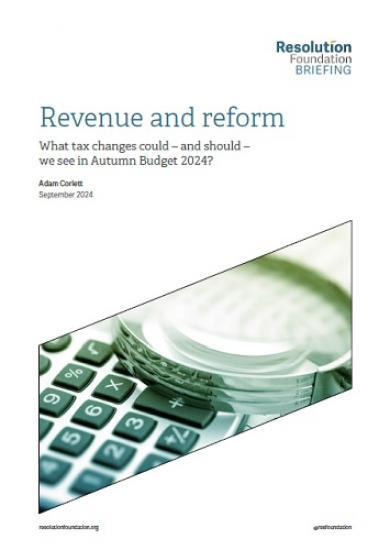Revenue And Reform What Tax Changes Could - And Should - We See In Autumn Budget 2024?
10th September 2024

Ahead of Autumn Budget 2024, this report explores some of the tax policy choices that may face the new Chancellor, and sets out what reforms could best raise revenue while also improving the design of the tax system.
There are many good reasons to expect a range of tax policy changes at this Budget.
It will no doubt deliver on the Labour manifesto's tax commitments, but the Chancellor will also need to grapple with a legacy of scheduled tax rises including upcoming increases in Fuel Duty and Stamp Duty and we set out proposals for these. It is also likely that there will be further new tax rises to ameliorate the public spending outlook.
The Government has ruled out some of the big revenue-raising tax options, but despite these constraints we find that there is still scope to raise substantial revenue - of over £20 billion if needed - with a focus on Inheritance Tax, Capital Gains Tax and pension contribution tax reliefs. Crucially, the recommended reforms would also make the tax system more consistent.
Progress is also needed to kick-off longer-term reform of other parts of the tax system, and we set out desirable directions of travel for business rates, Council Tax and the treatment of electric vehicles.
Key findings
As well as implementing Labour's manifesto policies, the Government will need to consider where it stands on some of the tax rises that have already been scheduled to kick in over this Parliament. In particular, we suggest that cancelling planned Fuel Duty rises should not be a priority - noting that real Fuel Duty levels will be historically low even with these increases - but that the scheduled rise in Stamp Duty in 2025 should be cancelled to support residential mobility.
While the Labour manifesto ruled out some major revenue-raising options, there are a range of alternative tax rises that would raise money from those with the broadest shoulders while making the tax system more efficient. Within Inheritance Tax, pension pots should be brought within scope, and business and agricultural relief should ideally be ended. Going further, the Government could end the complicated residence nil-rate band while adding lower Inheritance Tax rate bands.
Capital Gains Tax (CGT) should be a key focus and would ideally involve significant reform of the tax system. We suggest that marginal CGT rates for shares be aligned with dividend tax rates, and that property capital gains should be taxed like wages, but with inflation-indexing needed so as not to over-tax capital gains. This combination - creating both winners and losers - would raise around £8 billion per year. A consistent approach to tax rates would also imply that those for rental income and basic-rate dividends should rise. In addition, there should be CGT exit charges when moving country, and the tax should be applied at death (or rolled over), as these are currently ways to escape CGT entirely.
There are many options for reforming some of the unfairnesses in pension tax reliefs, but we suggest levying employer NI on employers' pension contributions – while also introducing full employee NI relief on employee pension contributions. This combination, raising up to £9 billion a year, would level the playing field between employer and employee pension contributions to end current arbitrary tax differences between workers.
The Government should also get the ball rolling on other much-needed tax reforms. We set out a growth-friendly way to fulfil Labour's manifesto commitment of replacing business rates; explore achievable ways to improve Council Tax; and suggest that civil service exploration of all the options for the future of motoring taxes needs to begin in earnest.
Read the full report HERE
Pdf 29 Pages.
